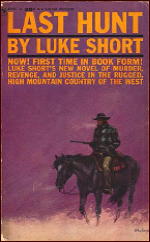Thu 15 Nov 2012
LUKE SHORT – Last Hunt. Bantam A2437, paperback original. First printing, August 1962. Reprinted several times, including: Dell, paperback, 1990.

You take a glance at the cover, it looks like a western: pictured is a man with a rifle on a horse, bundled up against the cold. You read the cover, it sounds like a western: “Luke Short’s new novel of murder, revenge in the rugged, high country of the west.†You start reading the first chapter, you could easily be confused into thinking it is a western — it is a Luke Short novel, after all.
That’s assuming, of course, you’re as easily confused as me. It wasn’t until page 7, where you will find a reference to someone unzipping his Eisenhower-type jacket that it dawned on me. It’s not a western.
Not one of the Old West, that is. What this is a modern day crime story, a detective story, one that takes place in the west, and yes, it’s in Hubin’s Crime Fiction IV. Murdered while hunting elk is a judge, a man who has just recently made a bitter enemy in a messy divorce case that just concluded in his courtroom.
Keeping in mind that I never really enjoyed the TV show Columbo all that much — you know the routine: the killer is known from the very beginning, and for the remainder of the program, the pleasure comes from watching the Lieutenant putting the pieces together and figuring out and trapping the culprit — I found it annoying that the same approach is what Short uses here. Let me quickly qualify that and say “mildly annoying.â€
For the most part, this is a man’s sort of book, filled with men who enjoy hunting, enjoy the out-of-doors and the companionship of other men, and with women who put up with, if not love, the kind of men who enjoy hunting — and so on. This is the time and place when people left their cars parked with the keys left in them, and there’s a definite nostalgia for times that no longer exist that comes into play as well.
In a small way this short novel (only 122 pages) reminded me of one the the old Gold Medal paperback originals that started coming out in the early 1950s, but upon second thought, I finally decided it lacks the pulpish edge (bordering on sleaziness) that those old GM paperbacks had.
In terms of the quality of the writing itself, Luke Short’s second of two entries (*) into straight crime fiction has a pulpish tinge, all right, but you also get the feeling that the story first appeared in — and was filtered through — a slick magazine like Collier’s or The Saturday Evening Post, which of course, it probably did.
The people that are encountered here are friendlier, and with perhaps one exception, they lack the quiet desperation in their lives the inhabitants of the Gold Medal novels usually had, the kind that pushes them into situations in which they soon discover that they’ve lost control of the events that follow.
What the big difference may be, and this may sound overly sentimental, is that when Last Hunt ends, you’ve become friends with the people in it, and you’re left wanting to know what happens to each of them in the rest of his or her life, and if it turns out as well for them as you want it to do.
(*) The other title is Barren Land Murders, which as a matter of fact was a Gold Medal PBO, from 1951.
July 2004 (slightly revised).